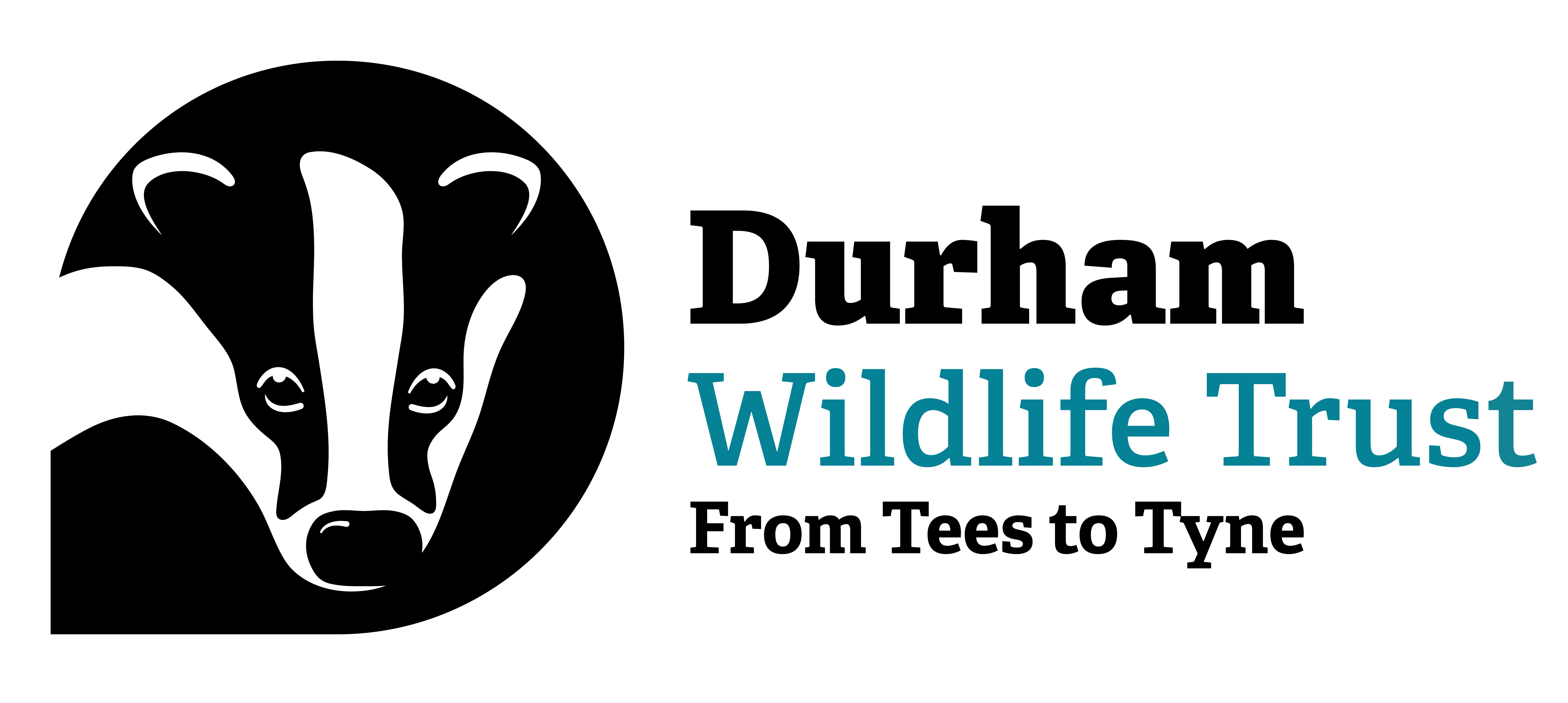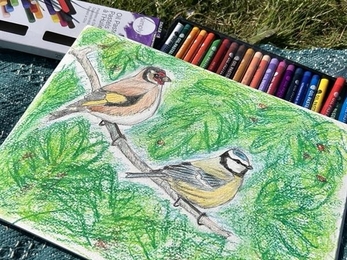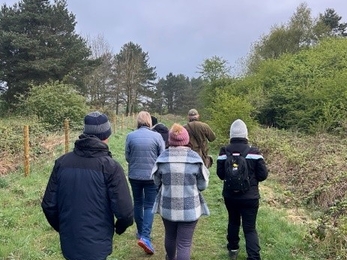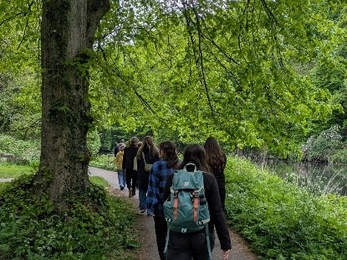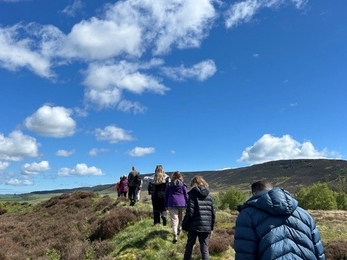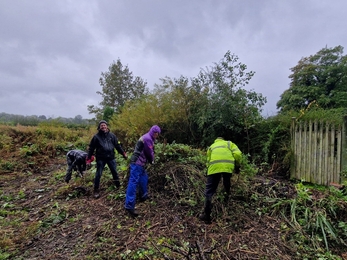There are many experiences I am pleased to share with my colleagues and friends at Durham Wildlife Trust and the wider conservation and ecology sector; the joy you feel when you spot your first bluebell of the year, the hypnotic feeling of awe when gazing at a starling murmuration, the vast relief when you finally get to take off your steel-toe capped boots and sit down after a day of fencing! These are just a few small examples of the wonderful feelings we get to experience when invested in and absorbed by nature and wildlife. But all good things come at a cost, right?
Eco-anxiety: a problem shared is a problem halved
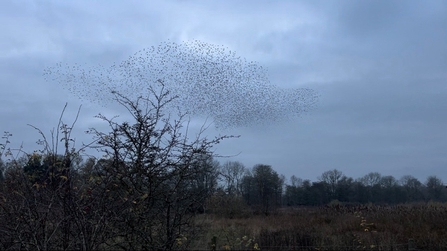
Starling murmuration over Low Barns Nature Reserve
Here’s the catch: another feeling I experience, alongside countless others from all walks of life across the globe who are invested in and absorbed by nature, is that of eco-anxiety. This is the feeling of dread, frustration, powerlessness and sorrow associated with nature’s decline and the worsening of environmental issues such as accelerated climate change, habitat degradation and species loss. When you put it like that – how can people not be worried?
When I say many others experience eco-anxiety, the stats are there to back me up: a survey of 10,000 people aged 18-34 across 10 countries in 2021[1] found that more than 45% of survey participants experienced disruption to sleeping, eating, working and other daily activities at the hands of worrying about climate change. Around 75% of participants reported that climate change made them view the future as ‘frightening’ and 56% said that it makes them think that humanity is ‘doomed.’ Perhaps even more concerning, in a YouGov survey of 600 UK primary school-aged children[2] nearly 4 out of 5 children (78%) said they were worried about climate change.
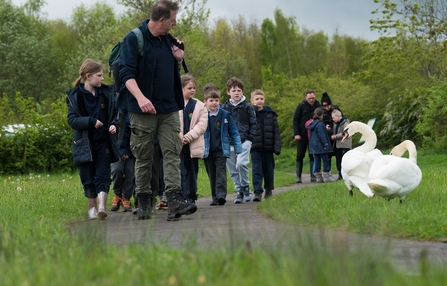
School trip at Rainton Meadows
This blog wasn’t designed to depress you. In a twisted kind of way – isn't it great that kids are worrying about climate change? Isn’t it great that 45% of that first survey’s participants were worried about the climate crisis? Isn’t it great that this monumental problem is getting the attention it needs for it to become a priority; for the climate crisis to take up more space at the political and societal tables? What we need to do now, is learn how to navigate these feelings of anxiety. And, you’ll be pleased to know, it may be easier than you think.
I am under no illusion that eco-anxiety can or should be completely cured, but based on our own experiences, the discussions we had during the workshop and that initial research, Mollie and I have come up with five steps which may help alleviate the potential paralysing effects of eco-anxiety:
1. Accept and re-brand
Eco-anxiety is a very valid and human response to a very distressing situation. It is important to recognise that feeling a sense of dread is not you being over-dramatic, and supressing such feelings may only make them worse. Instead, embracing the discomfort of eco-anxiety can help you to take the first step to meaningful action. Once accepted, you may find that a simple re-brand can help you take back some power. Instead of having ‘eco-anxiety,’ can this be considered as having ‘eco-empathy’ or ‘eco-compassion’?
Surely, caring for the environment is something to take pride in, and in a lot of cases is in fact a strength which can be used to mobilise positive action.
2. Remember the positives
When social media exposes us to article after article about natural disasters, policy backsliding or species and habitats falling under the thresholds of recovery, it can be almost impossible to find the breathing space to process, reflect on, scrutinize and evaluate exactly what position this puts us in. This can leave us with a distorted and overly pessimistic perception of the state of global nature, with our last grasps of hope crumbling in an apparently shrinking timeframe. It sometimes feels as though the bad news outweighs the good ten-fold. It’s almost as if the hundreds of news sources have a financial incentive to taking advantage of the human tendency to be more attracted to bad news than good news...
Of course, there are very real negative news stories relating to nature’s decline being reported on every week, and it is important to not bury our heads in the sand about these, but it is also important to remember that there are a lot of very positive and impactful climate wins happening at the same time. These are just sometimes harder to find.
Things you can do to increase your positive news uptake:
- Follow dedicated ‘good news’ channels on social media.
- Choose reputable news sources who offer balanced, non-biased perspectives as opposed to sensationalism.
- Interact (e.g. liking, sharing, commenting) on more positive stories to ‘train’ the algorithms into giving you more of the same type of content.
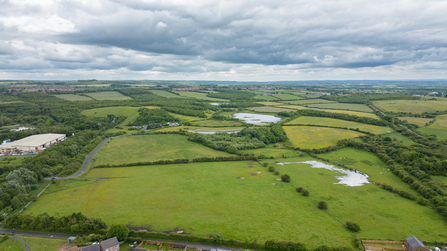
The land the Trust hopes to purchase in the foreground and the rest of the nature reserve beyond.
Additional land at Rainton Meadows recently acquired by Durham Wildlife Trust, successfully safeguarding the nature reserve from encroaching housing development.
3. Take a breather
This is my personal favourite. As is my usual response to the various other stresses of life, when I feel myself getting overwhelmed by disheartening climate-related news, I like to take a walk or find a good bench to sit on outside, preferably in a good nature spot. When I am walking, or sitting, it often doesn’t take long for the world around me to make itself known. The birds that have been calling and singing since before you arrived will become louder, the more delicate flowers hiding under the hogweed will become brighter, and the trees which have been swaying for years will become... sway-ier. And this doesn’t stop when you get in the car and go home. Although I have come into nature to escape nature-related stresses, this is a different kind of nature. This nature is carrying on, unencumbered by any sense of urgency or panic. This bird doesn’t have to try and work out climate resilience – this bird just needs to find seed today. Of course, this is a gross over-simplification of what a bird actually has to do each day, and if you think about this too deeply then you may end up at square one, but for a moment, at least to me, focusing on the minute details of wildlife acts as a mental reset and reminds me of who I am fighting for.
Giving yourself a break to reset can prevent burnout, fatigue and becoming overwhelmed – things that can hold you back from being an effective champion of nature. And we wouldn’t want that, would we!
The below images show examples of how I have recently taken a breather in nature.
4. Connect with wider communities
People often feel isolated when experiencing eco-anxiety, especially if they’re not involved in an environmental profession, volunteer work or connected to environmental movements. It can sometimes be difficult to start conversations surrounding your concern for the environment or advocate for environment-friendly changes, particularly if those around you do not appear to have the climate as one of their priorities or concerns. How is it that although the evidence tells us that a significant proportion of the population are experiencing negative emotions surrounding the climate, we’re not having more conversations about them?
Finding networks of people who empathise with your frustrations and with whom you can discuss your fears for the climate can help to take the weight off your shoulders. Joining a group with a shared goal such as a conservation organisation, local campaign group, environmental charity, environmental network or ‘friends of’ group can also help you to feel motivated, empowered and supported. The climate crisis is not a problem you have to face alone, and it will take a collective effort for things to change.
The below images show two examples of communities I have connected with in the past month.
5. Channel your anxiety into action
Channelling your anxious energy into positive and meaningful action is perhaps the most popular recommendation for navigating climate anxiety. The idea is that contributing to nature’s recovery or protection in some way, whether locally, nationally or globally, can increase your sense of empowerment and reduce feelings of helplessness. Whether it be volunteering for a local conservation organisation, supporting an environmental campaign, signing a petition to encourage policymakers to act in favour of nature or ensuring you are taking nature-friendly action in your local greenspace or garden, there are countless ways to advocate for the environment.
There is no doubt that meaningful action is necessary and highly valuable. This recommendation, however, comes with the important caveat that that you do not need to do all of these actions at once, and it is okay to take breaks.
The below images show Durham Wildlife Trust volunteers taking action for nature through practical conservation work at a number of local wild spaces.
As mentioned previously, the onslaught of negative climate news can create a sense of urgency and panic surrounding the climate crisis; it can often feel as though if we’re not giving 100% of our energy to tackling climate injustices and supporting every campaign out there, then we are letting the environment down. For a lot of people, expending all of their energy across multiple demanding initiatives, and not taking time to process positive news stories, take breathers and look after themselves, will lead to burn-out or heightened experiences of eco-anxiety. As with most things, balance is key. Specifically, a balance between positive action, reflection and self-care can be more conducive to sustainable activism and long-term efforts. Eco-anxiety can be experienced by people to varying degrees, and, sadly, it is the case for some that it is completely debilitating. But, by talking more openly about our very valid experiences with eco-anxiety, we can hopefully find strength and reassurance in the fact this feeling is not experienced in isolation. I am a strong believer that a problem shared is a problem halved, after all.
References
[2] Majority of under-12s worried about climate change, survey shows - Greenpeace UK
